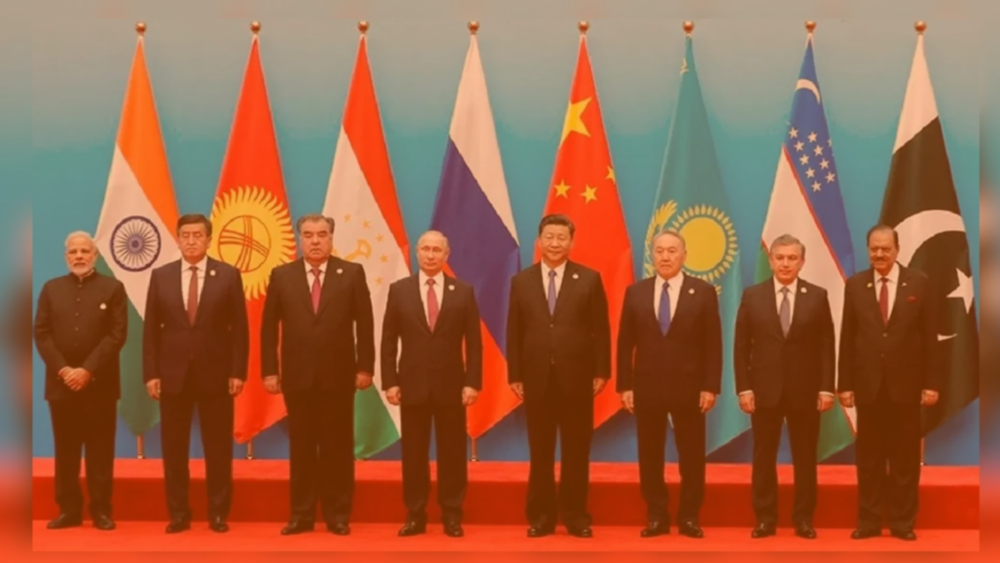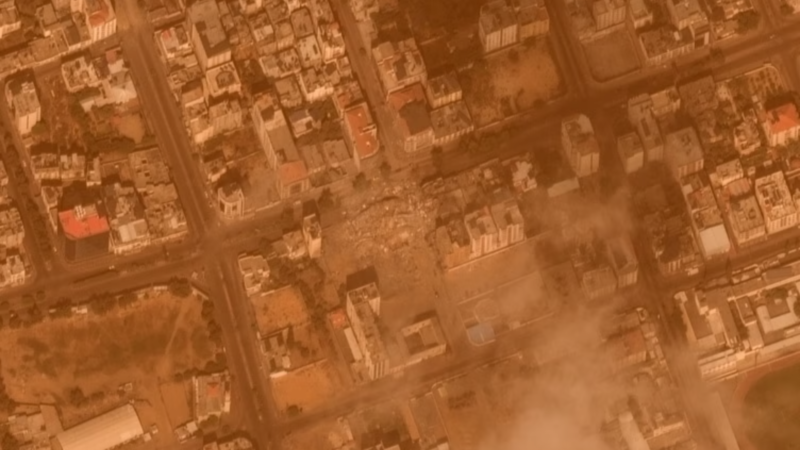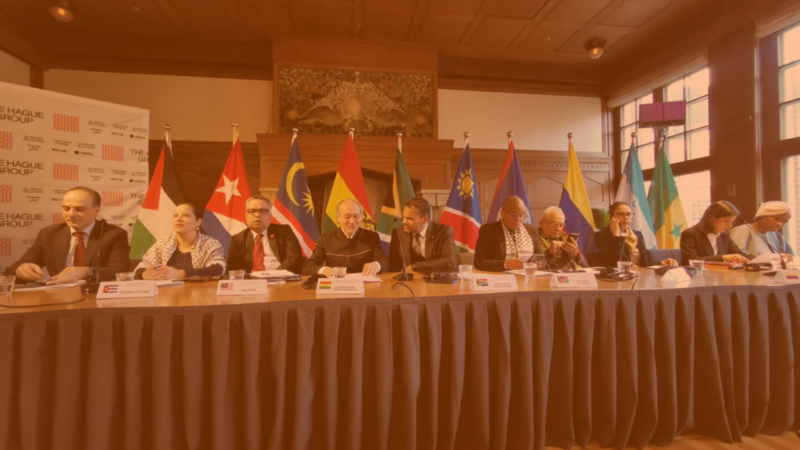BRICS is not what leftists around the world had hoped for in a just, postcolonial world. Nevertheless, the group is growing, and it increasingly positions itself as an alternative to Western hegemonic rule. To the outside, the diverse members display a remarkable declarative unity on global issues. While their economic vision only offers more of the same neoliberal positions, their joint foreign-policy declarations sound – especially when compared to recent official statements by the EU, US, or NATO – reasonable and deescalating. The changing international power structures can be an opportunity for progressive movements across the globe to go beyond what’s happening on state level
India’s ultranationalist prime minister Narendra Modi is not a person I quote with enthusiasm, but he reportedly summarised it quite well: “BRICS is not anti-West, it is simply not Western.” Notwithstanding, there clearly is a shared discontent of varying degree with Western hegemonic power, for all the obvious reasons.
We should be under no illusion, BRICS is not what leftists around the world had hoped for in a postcolonial world. Most members have authoritarian or at least repressive tendencies, images of high-level gatherings hardly show any women, and socialism is not on the agenda.
Nevertheless, it is very interesting to look at the recent BRICS summit in Kazan, Russia, that took place from 22 to 24 October 2024. In fact, it would be negligent not to, as:
- The current nine BRICS members are home to 45% of the world’s population and – to use a widely accepted measurement – generate 35% of its GDP (as by purchasing power parity), while the Western-dominated G7 account for 10% of the population, and around 30% of the GDP
- The BRICS countries – Brazil, Russia, India, China, South Africa, Egypt, Ethiopia, Iran, and the United Arab Emirates (UAE) – invited 13 new “partner states” into their alliance: Algeria, Belarus, Bolivia, Cuba, Indonesia, Kazakhstan, Malaysia, Nigeria, Thailand, Turkey, Uganda, Uzbekistan, and Vietnam
- BRICS unites countries with significant historical and ongoing political differences, like India, China, and Russia, or Iran and the UAE
- Saudi Arabia, a US ally and adversary of BRICS member Iran, attended the summit as an “invited nation” and acknowledged growing ties with the alliance though it has so far not accepted the standing invitation to join
- With Turkey, a NATO member may join BRICS in the future
- BRICS is contemplating a new financial transaction system independent of the US Dollar and the SWIFT system, to be, like back in the old days, (at least partly) backed by gold, and with the potential to render economic sanctions against its members futile
- BRICS has no military alliance like NATO, and it does not look like they are planning one (what they do have, though, is a bank)
- The summit leaves the impression that Russia, the host, is not as isolated as we in the rest of Europe tend to believe
In light of this, it is no surprise that UN Secretary General António Guterres, as the world’s top diplomat, visited the summit, where he also met Russian president Vladimir Putin on the sidelines and called for an end to the war in Ukraine in his official address. That Ukrainian president Volodymyr Zelenskyy subsequently refused to receive Guterres in Kyiv is somewhat reminiscent of Israel declaring him persona non grata.
It is tragic, or rather infuriating, that the West and its allies increasingly behave like rogue states in the international arena. There is no question about severe transgressions – be it Russia’s war on Ukraine, China’s repression against minorities, Iran’s oppression of women, the UAE’s involvement in Sudan’s civil war and mass starvation, or India’s Hindutva ultranationalist, anti-Muslim policies (which the West has so far not identified as a problem) – but since when is diplomacy no longer an option in international relations? And where should we even start to list the West’s violations of international law and basic principles of humanity? Currently, the active participation in Israel’s genocide in Gaza certainly tops the list.
Apart from the hardline stance against any visible sort of negotiations to end wars, military or economic, it looks like Western governments and established media are in denial of the emerging challenge to its sole rule. The German prime-time public news programme Tagesschau, for example, nonchalantly took note that “China and some other states are founding a ‘group of peaceniks’ (Friedensfreunde)”. Sorry, but this is a parallel universe, and it is bad for Europe to pretend that there is no such thing as a developing multipolar order, no matter whether we want to call it that or something else.
Though BRICS is showing more signs of institutionalisation, like its New Development Bank and membership procedures, its makeup bears some resemblance to the Non-Aligned Movement, only that its politics are unfortunately less appealing than the principles originally proposed at the Bandung Conference in 1955.
It also appears that the BRICS Summit was more of a symbolic event than one of groundbreaking decisions. Beyond verbose commitments, the practical outcomes of the summit seem relatively modest. No BRICS currency was announced, nor were any more states admitted to the group. The 13 new countries are for the time being not members but “partners”, which, in any case, is a significant development.
The Kazan Declaration: Strengthening Multilateralism for Just Global Development and Security was already published on October 23, only halfway through the event. By the way, the phrasing of the lengthy 32-page document, too, sounds a bit like classic non-aligned rhetoric, including its wordiness, such as the repeated commitment to the “spirit of mutual respect and understanding, sovereign equality, solidarity, democracy, openness, inclusiveness, collaboration and consensus”, as well as a strong focus on the UN Charter und bodies. At the same time, it reaffirms “support for the rules-based, open, transparent, fair, predictable, inclusive, equitable, non-discriminatory, consensus-based multilateral trading system with the World Trade Organisation (WTO)”, as well as “commitment to maintaining a strong and effective Global Financial Safety Net with a quota-based and adequately resourced IMF at its center.” There goes the revolution… BRICS aims for economic consolidation within the neoliberal framework.
With regard to the most contentious international crises, the joint declaration is also far from radical, but – compared to the belligerent statements from the EU, US, or NATO – it does sound like a voice of reason. Concerning Russia and Ukraine, it recalls “national positions concerning the situation in and around Ukraine as expressed in the appropriate fora, including the UNSC [UN Security Council] and the UNGA [UN General Assembly]. We emphasise that all states should act consistently with the Purposes and Principles of the UN Charter in their entirety and interrelation. We note with appreciation relevant proposals of mediation and good offices, aimed at a peaceful resolution of the conflict through dialogue and diplomacy.” On Iran, it stresses, for example, “the importance of full implementation of the JCPOA [the so-called Iran Deal] endorsed by the UNSCR 2231 (2015) and underscore the importance of a constructive approach based on the good faith by all relevant actors to resume full implementation of the JCPOA commitments by all sides.” In relation to Israel-Palestine, it adopts the longstanding UN position of the establishment of the “State of Palestine in line with internationally recognised borders of June 1967 with East Jerusalem as its capital living side by side in peace and security with Israel”, with no mention of words like war crimes, genocide, or apartheid. However, the BRICS members do explicitly “acknowledge the provisional measures of the International Court of Justice in the legal proceedings instituted by South Africa against Israel.”
Having said all this, two aspects are indeed remarkable. Firstly, despite all their political differences and diverse cultural heritage, the representatives at the summit, including some 20 Heads of State, were able to come up with a common understanding of what they generally stand for as members of the international community. Secondly, and much related, nothing in the wording of the summit declaration is formulated as a threat to anyone, nor is any specific group or state identified as a threat.
One may buy into it or not, but the absence of warmongering is in itself an achievement, given the situation the world is in. So, if we put skepticism aside for a moment, and consider the possibility that leaders from the Global South and East essentially mean what they say in an official statement on their vision of international relations, then things could fundamentally change. To come back to the beginning, if there was a common understanding that BRICS and its members are indeed simply not Western, instead of wanting to defeat the West, the potential to end the destruction of the planet, (proxy) wars, regional insecurity, and internal strife would be immense. This of course requires Europe and the United States to change their ways, which, given the far-reaching global transformation that is underway, is bound to happen anyhow, for better or for worse.
In the spirit of internationalism, I want to emphasize that I am referring to the practice of inter-state relations here, without meaning to downplay or deny the internal and interrelated struggles for justice in all our respective countries. The emerging counter-weight to the current hegemonic rule can be an opportunity for progressive movements across the globe to reshape the political and economic order beyond what is offered on state level. In that sense, I wish that one day, we will push Europe towards becoming an emancipated, non-aligned region that rediscovers its humanist values in a postcolonial world.
Do you want to be informed of DiEM25's actions? Sign up here















